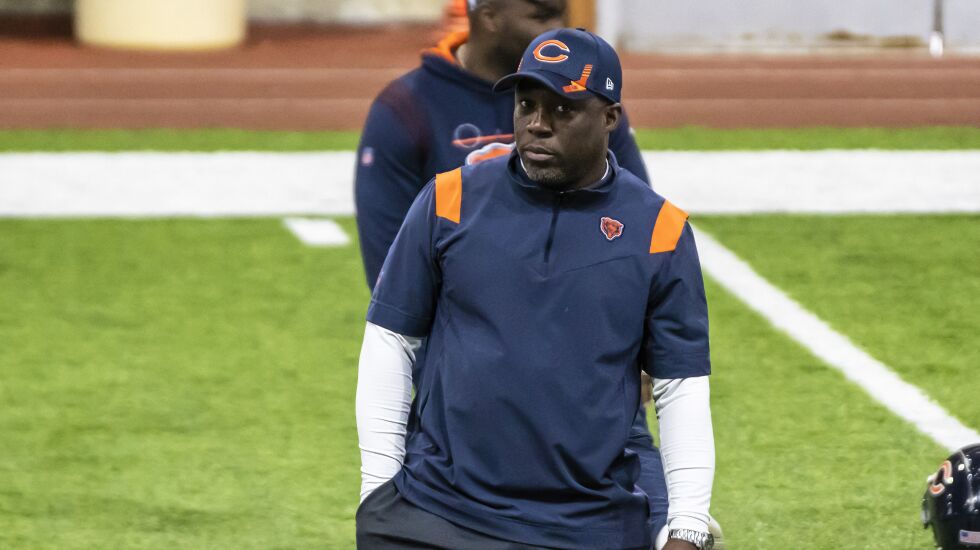
Close your eyes and think about the Bears’ defensive coordinators over the past decade. Bet you can picture each one of them.
The intense Mel Tucker was the future Michigan State godsend. Vic Fangio dressed like your old gym coach but is perhaps the best-respected coordinator of his generation. Chuck Pagano, the former Colts head coach and cancer survivor, spoke in thousand-word chapters and sounded like a walking self-help audiobook. Sean Desai, a professor in his spare time, was an academic.
Into that parade of play-callers steps Alan Williams, a 52-year-old lifer who has been on an NFL defensive staff each season since 2001. You probably can’t see him in your mind’s eye, and with good reason — but for a bumpy two seasons calling plays for the Vikings, he’s been a position coach.
He knows the opportunity that awaits him.
“Think about this: I’m the coordinator of the Chicago Bears — I’m the defensive coordinator,” he said after Saturday’s training camp practice. “And so, there is no job better in the world — maybe [head coach Matt Eberflus]. I get to coach defense for the Chicago Bears. …
“I’ve always appreciated that I get to coach football for a living. There isn’t a job better than the one I have. None.”
The last two to hold his position have failed. So has Williams. That’s perhaps his greatest strength entering his second chance at play-calling — the humility to know he needed to get better.
He coordinated the Vikings under defense-first head coach Leslie Frazier from 2012-13. In Year 1, the Vikings were smack in the middle of the league: 16th in yards allowed and 14th in points given up. In Year 2, they were last and second-to-last, respectively. Everyone got fired.
Despite his coaching tree — Williams worked under Tony Dungy (“I’m not sure what I didn’t learn from him,” he said), Jim Caldwell, and Frank Reich — that two-year stint might have been enough to keep the 52-year-old out of NFL coordinator conversations moving forward. But when Eberflus got the Bears job, he brought most of his Colts defensive staff with him. Williams had been his defensive backs coach the previous four seasons.
Unlike Matt Nagy, Eberflus has refused to anoint himself the play-caller as head coach. Williams, he said, will be the ones calling the plays and helping enforce his H.I.T.S. principal, which harps on hustle, intensity, takeaways and smarts.
Nine years since he was last a coordinator, Williams thinks he’s that much wiser.
“I’d hope right now that I’m a little more mature, that I handle situations—adversity—a little bit better,” he said. “I would think at this point I know football … a little bit better. I handle the staff better in terms of interpersonal skills. ...
“And then the players, I think that I was so intense about every situation. Every situation is not live-or-die. So right now I think I’m a little bit more relaxed … I’m a lot more relaxed. And so they get to know me. They get to know not just Coach Williams — they get to know Alan Williams.”
Friday night, the Bears installed a blitz package. Saturday, a defensive player gave up a busted-coverage long play while running it for the first time.
“I would have hit the roof before,” Williams said. “And now it’s just, ‘Hey, this is what we need to do. We’ll go over it again.’ I would have jumped the coach and the player. I would have been super stern.
“Now? ‘It’s Day 4. …’ Not that the standard isn’t the standard, but we’re working to get there.”
When Williams coached in Indianapolis, seven-time Pro Bowl edge rusher Dwight Freeney spoke to the team. He told them something that’s always stuck with Williams: “Where you are and where you want to be, those two people can’t coexist in the same space.”
Since the last time Williams called plays, he said he’s learned to make decisions based on the collective — and not to feel like he has to do it all by himself.
“We’re in the problem-solving business,” he said. “That’s what we do.”
Williams has spent the last nine years searching for answers. Now he gets his second chance.
No wonder he thinks it’s the best job in the world.
“Reflecting back on some of the mistakes that I’ve made in my younger years — and correcting those,” he said. “We ask players all the time, ‘Hey, mistakes that you made yesterday — don’t make the same mistakes tomorrow.’ …
“So if I’m gonna ask the players to do those types of things, I have to do that myself.”







